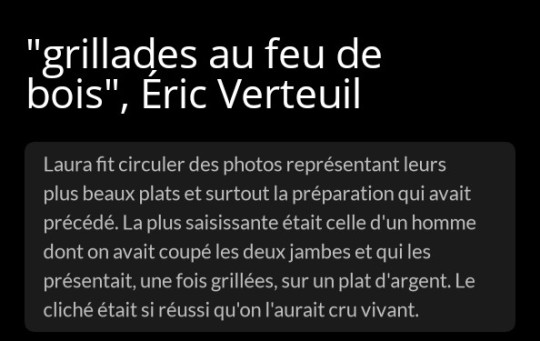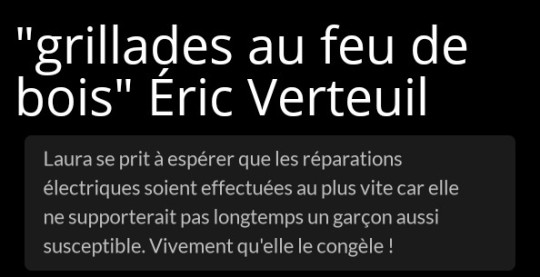#Fleuve Noir
Text

A Scattering of Jades - art by Guillaume Sorel (2006)
#guillaume sorel#fantasy art#horror art#cover art#alexander c. irvine#mystery novels#fantasy novels#le soleil du nouveau monde#fleuve noir#2000s#2006
542 notes
·
View notes
Text
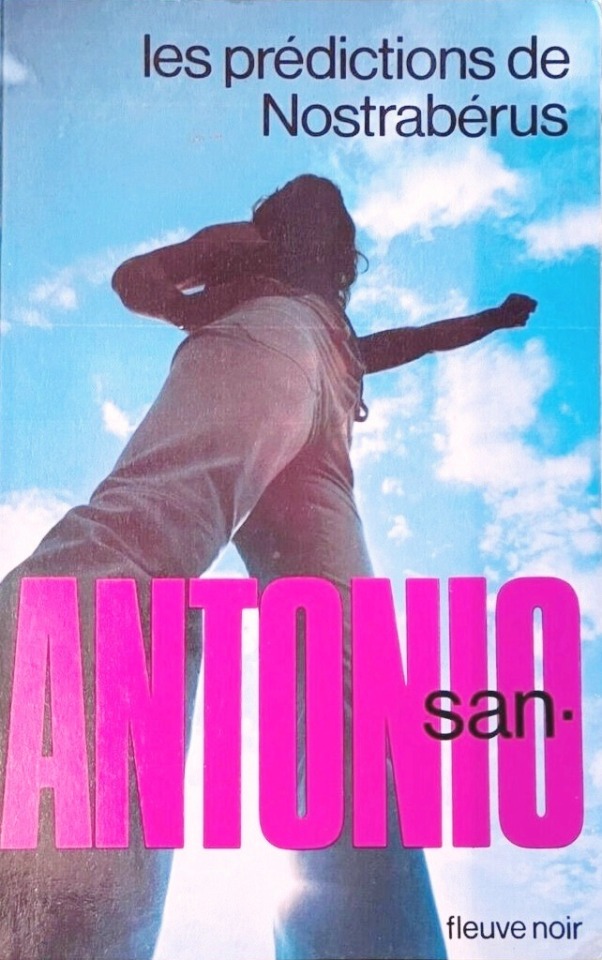
San-Antonio - Les Prédictions de Nostrabérus - Fleuve Noir - 1974
#witches#prédicteurs#occult#vintage#les prédictions de nostrabérus#san-antonio#fleuve noir#frédéric dard#nostrabérus#predictions#1974
18 notes
·
View notes
Photo
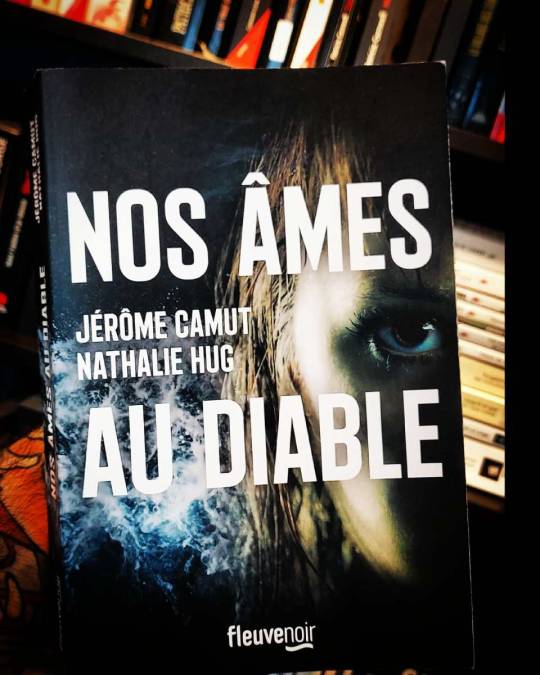
(via "Nos âmes au diable" de Jérôme Camut et Nathalie Hug)
Super lecture, encore un fois je ne suis vraiment pas déçu malgré les énormes attentes que j’avais sur ce livre et bien il a été à la hauteur des espérance.
Un excellent thriller psychologique, on suit étape par étape la vie d’une femme dont l’enfant a été enlevé.
On commence donc sur une « banale » histoire de kidnapping d’enfant et on se prend ensuite dans un engrenage infernal.
On se prend gifle sur gifle et certaines sont très inattendues.
On jongle d’un personnage à l’autre, d’un point de vue à l’autre, sans aucun répit.
Les quatre mains qui ont écrits ce roman sont habituées à l’exercice alors attendez vous à un livre avec de gros retournements de situation et d’une noirceur incomparable.
On retrouverai presque l’ombre de Kutz et Seven à certains passage…. Et pour ceux qui ont, tour comme moi, apprécié « les voies de l’ombre » alors vous apprécierez très certainement ce livre aussi.
Seul petit bémol, j’aurai bien aimé que certains passages soient plus développés. Certains livres méritent 200 pages en moins celui ci en mérite 200 de plus !
#books and reading#reading#thriller#thrillerbooks#livrestagram#livreaddict#livre#avislecture#bookaddict#book review#book recommendations#book blog#book#nos âmes au diable#jérôme camut#nathalie hug#fleuve noir
0 notes
Text

QuaideSeine-Saule-Fev2024©FrançoiseLarouge
#photographers on tumblr#black and white#paris#noir et blanc#saule#weeping willow#tree#river#fleuve#quaisdeSeine#artists on tumblr#blackandwhite#photographiecontemporaine
28 notes
·
View notes
Photo
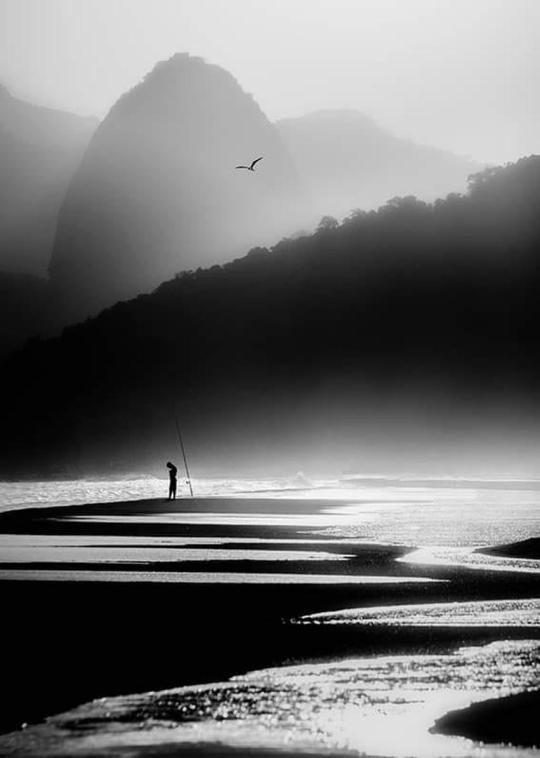
Luiz Bhering. River landscape, Rio de Janeiro. 2020
#BW#Black and White#Preto e Branco#Noir et Blanc#黒と白#Schwarzweiß#Luiz Bhering#river#fleuve#Fluss#rio#川#río#rzeka#강#河#landscape#paysage#Landschaft#paisagem#風景#paisaje#krajobraz#경관#景觀#Rio de Janeiro#Brasil#2020#2020s
201 notes
·
View notes
Text



Sur les Berges de la Garonne.
Photographier avec un Olympus om20, film Agfa APX 100. Par @kaouyana .
#noir et blanc#argentique#grafiti#monochrome#photographer#photography#my photos#picture#photografy#noir blanc#olympusphotography#fleuve#garonne#toulouse#film 35mm#35mm film#35mm photography#agfa apx 100
4 notes
·
View notes
Text
Perigord Noir (4)
La Madeleine
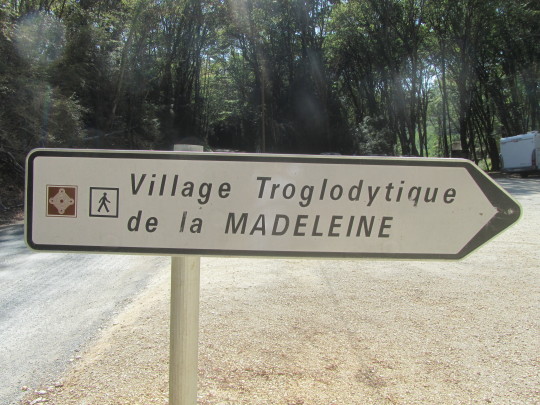










La Roque Gageac


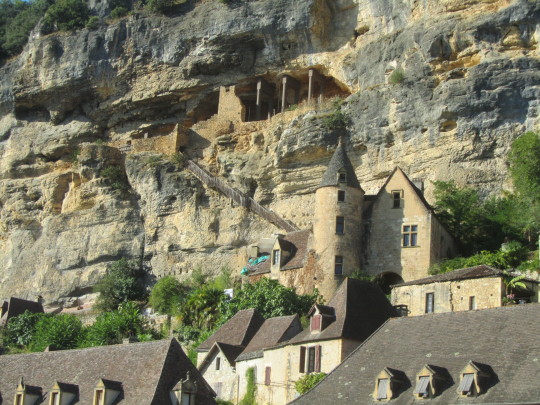




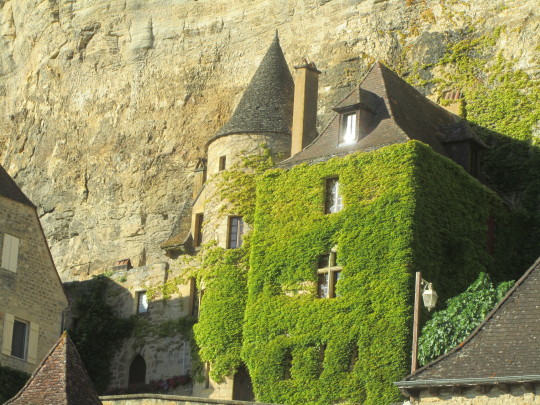



1 note
·
View note
Text
La rivière Ruki, la rivière la plus sombre du monde
Nouvel article publié sur https://www.2tout2rien.fr/la-riviere-ruki-riviere-la-plus-sombre/
La rivière Ruki, la rivière la plus sombre du monde

0 notes
Text
Jimmy Guieu, L’ordre vert
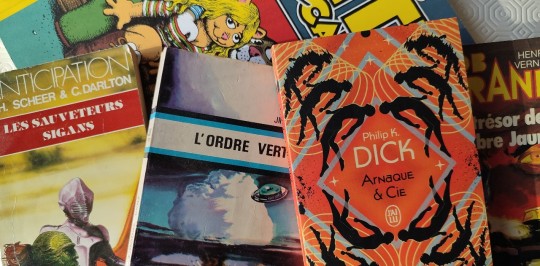
View On WordPress
0 notes
Text



#pont Jacques-Cartier#montréal#québec#fleuve#ballon dirigeable#zeppelin#construction#bridge#bateau#1925#circa 1929#noir et blanc
0 notes
Text

Bob Layzell, cover art for Les neuf dieux de l'espace by Frank Dartal (Fleuve Noir, 1977).
#science fiction#book#cover aet#spacecraft#Bob Layzell#Les neuf dieux de l'espace#Frank Dartal#UK#France#1977
62 notes
·
View notes
Text
French fantasy review: Les flammes de la nuit
I do wonder why I make these posts – about French novels that I do not think were translated in English, reviewing them in English on an English-speaking website… I do know that some French people are lurking around under a mask of Englishness, but still, most people here are those that I guess will never have access to the novels I review… But oh well, I’ll do what I’ll do, as bizarre as it may sound: and what I’ll do is talk about the French fantasy.
I already translated a long time ago some articles written about the French fantasy literature, but here I will share my personal thoughts and favorites when it comes to this genre of fantasy that is considered “foreign” and “exotic” by the simple virtue of… not being written in English. France is the land of literature, and has already bred, nursed and thoroughly exploited and theorized the two genres that gave birth to the fantasy and yet are so hard to translate in English: the merveilleux of fables and epics, the fantastique of 19th century supernatural tales… Why wouldn’t France have fantasy too? The name of the genre stays English, unfortunately, but it has enough echoes and roots within our own féeries and surnaturel to find a place prepared for it since centuries…
Anyway, enough lyrical: let’s get into the meat of the subject, let’s dig to the bone, and I want to begin with “Les flammes de la nuit” (The flames of the night) by Michel Pagel.
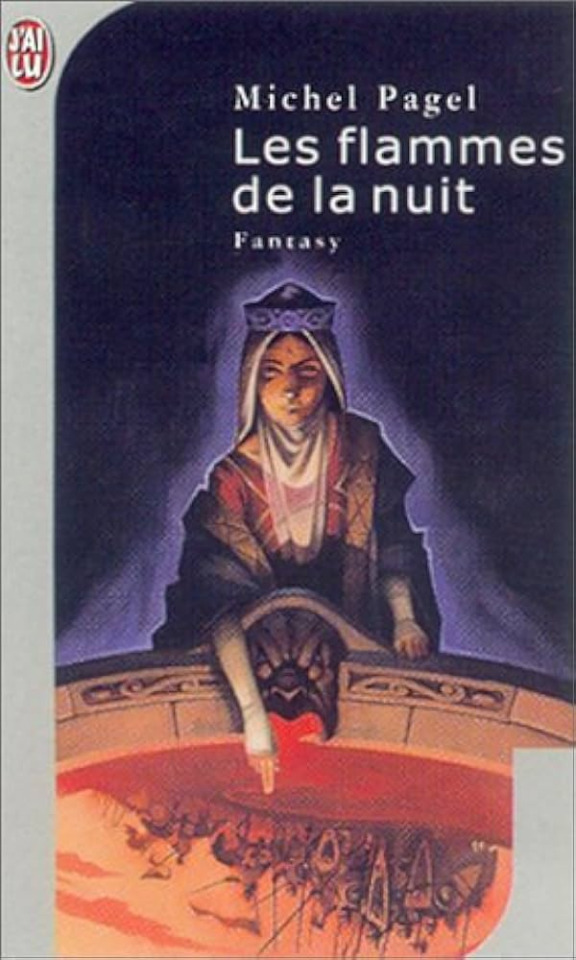
When I picked up this book I was not expecting anything precisely from it, I was just curious. I had only ever heard of Michel Pagel through a huge and dark series of his called “La Comédie Inhumaine” that everybody loved and that was renowned as a dark and violent fantastique, but I never read it. The reason I picked up this book was due to its relationship with fairytales. If you do not know I am REALLY into fairytale stuff, I even have an entire sideblog just to talk about fairytales ( @adarkrainbow ). And this novel was advertised as being a fairytale subversion, so I thought, let’s get into it! [EDIT: I actually also had heard of Michel Pagel through another work of his that now I will definitively read, Le Roi d’Août, a supernatural historical novel that faithfully retells the biography of the king Philippe Auguste… While filling some historical blanks in his life by the intervention and encounter of the supernatural folks hiding within the French landscape.]
Most notably, when I checked briefly online reviews to see if I should get the book, all agreed on a same thing: all said that the book was absolutely great, with wonderful ideas and powerful characters… until the very end which had disappointed everybody (at least at the time the reviews were made, so by the 2000s/early 2010s). As a result I went into this novel saying to myself “Okay, the beginning and middle will be great, the end will be bad, get ready”. And… what a surprise! The ending was not bad at all. A bit confused and rushed but… it was a good ending. Or rather a fitting ending (because it is not a happy or positive one, nor is it a negative one – it is a grandiose, tragic, bittersweet but hopeful ending perfect for the tone of the novel and the project the author set upon himself). If you ask me, all the reviews were wrong – and I had been deceived for the best, since the novel surpassed what I was expecting. Now, I won’t throw the stone, I actually understand why these readers were disappointed with the ending and I’ll explain why (spoiler: it is a question of context and point of view). For now, I’ll simply say that I greatly love this novel which definitively goes into my top French fantasy novels.
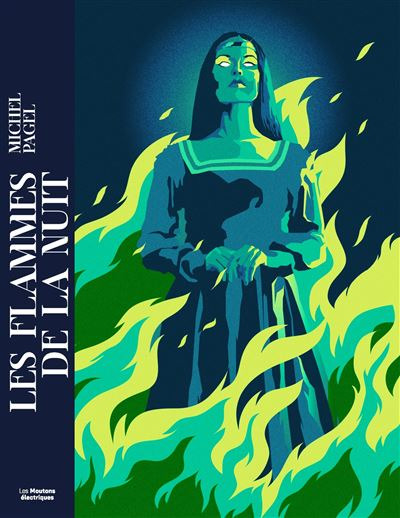
In terms of editions and publications, a few indications… This is one of those typical edition thingies that are so peculiar to France. The novel was originally published as a series of novellas. Four in total, between 1985 and 1987, in the “Anticipations” collection of the Fleuve Noir publishing house (it was still in this era where in France fantasy and sci-fi were sold together as one and the same). Later, the four novellas were collected into one full volume, one novel divided into four parts. This complete volume was published in 2000 (in a small format by the J’ai Lu Poche Fantasy, in a large format by Denoël collection Lunes d'encre), and it is both the version I read and the one most people refer to when talking about “Les flammes de la nuit”. I do not know if the text was edited or slightly rewritten for this new format – I don’t think so, but I have to admit the text felt so much like an early 2000s story I was quite surprised it came from the mid-80s… There’s quite notably the fact the main character is openly bisexual, but hey, the 80s in France were quite a time too… More recently in 2014 Les Moutons Electrique republished the integral in a large format, and then in 2022 in a middle format, proving this novel’s great and enduring success.
[Note: As I am writing this post I made a quick checklist and I just discovered that Michel Pagel actually was the French translator of Neil Gaiman’s Anansi Boys and American Gods, as well as of Gary Gygax’s Monster Manual for D&D… Wow, that was a total surprise – and it does explain some things, I notably see how Neil Gaiman’s writing could have had an influence over this novel…]
Let me briefly set you in the mood the very first pages plunge the reader into… We follow an old man who is travelling on a pilgrimage to a great lake at the center of a medieval kingdom name Fuinör. He isn’t just any old man: it is but one of his masks. He is the Enchanter, a great and powerful wizard as old as the universe itself, a supernatural being known to take many forms, and who can be as much a wild animal of omens as a seducing woman luring knights to an uncertain doom… Once he reaches the great lake, called the Mirror for its still waters form the perfect reflection of the sky and the sun above it, in a great burst of light, the sun disappears… and reappears. But the sun is not golden anymore: it is green. And with the sun everything changed color within Fuinör: the sky is not blue but indigo, the sea is the color of emerald, the trees have blue leaves, human skin is orange… And this is perfectly normal, for in the world of Fuinör, every seven years the sun is reborn above the lake, turning into a different color, and with it everything in the world also changes its hue. And as such, seven year by seven year, the light goes through all the seven colors of the rainbow…
This sets the stage for what “Les flammes de la nuit” is. And it is many, many things, a story which likes the sun of Fuinör undergoes different stages and tones (the serial publication helps this feeling of slow transition and evolution throughout the novel).
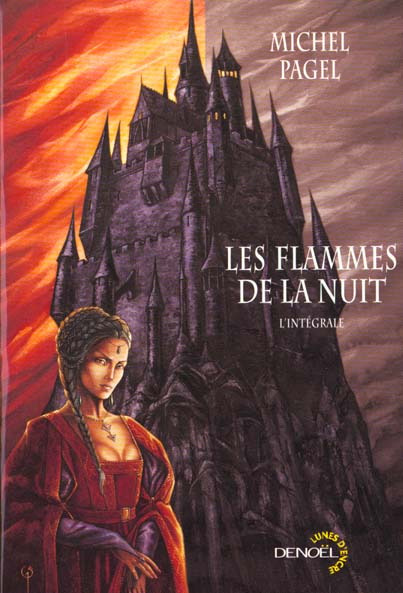
The story opens as an open, cynical and dark parody of fairytales – for the world of Fuinör is a world of stock fairytales. It is a world in which, when the king has a daughter, seven fairies, each for each color of the rainbow, arrive to bless her with all the usual gifts – beauty, grace, singing – while carefully avoiding anything like strength or intelligence, for these are male gifts for those destined to rule. It is a world in which, when the queen gives an heir to her king (and there is always only one king and one queen), she must die in labor – and if she happens to survive… then the royal doctor must prepare a certain powder to make sure the queen respects the tradition. It is a world where barons often declare themselves vile rebels and wicked usurpers and try to overthrow the high king… but they are always defeated because the law claims there can only be one rebellion at a time, and each baron must warn in advance the king and let him decide how, when and where he wants to do the battle. It is a world where there is a land for each thing – quite literally. Fuinör is divided into different “countries” each dedicated to a specific area: there is a land of Hunting, where the hunts take place, and any hunting elsewhere is outlawed. There is a land for War, and nobody would ever think of waging war elsewhere than there. There is a land for Love, and all love and romance and sex can only take place within its boundaries. Such as the laws, and the customs, and the traditions, and they have always been since the beginning of time…
Fuinör is a mix of all the classical fairytales and the traditional medieval romance and Arthurian tales – but all taken to an extreme. Fuinör is a world stuck in an endless cycle of loops, where the events all repeat themselves in the same way with predictable end, where everyone is given a specific role and fate since birth, where everything is stuck under an order that has been decided by ominous gods a long time ago, and where no surprise and no disorder can ever happen. The brave knights in shining armor always win the heart of princesses, the high king is always victorious of anyone that tries to take his throne – and if someone ever does, THEY are the rightful high king and the other is the usurper – and the peasants… well who cares, they don’t count, they’re not even considered human, they are just here to work and be background props.
But things will change… Things will change thanks to the Enchanter, who decides that when the new princess of the kingdom is born, little Rowena, she shall receive a gift no other princess ever received… the gift of intelligence. An intelligence that will allow her to understand the absurd logic of her world, and use the sclerosis of archetypes and the rigidity of millennia-old customs to her advantage. An intelligence that will make her greater and more powerful than anyone – an intelligence that will threaten the very existence of Fuinör… Thus is the beginning of “Les Flammes de la Nuit”.
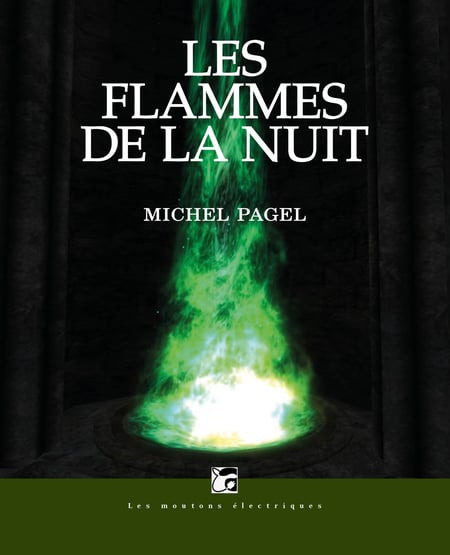
The beginning of the novel, Rowena’s own youth and story, is clearly designed to deconstruct all the archetypes, stereotypes and point out all the bad side of both the generic fairytale (especially Disney’s version of fairytales – the novel is filled with jabs at Disney and the “Americanized” fairytale, the seven fairies being basically Disney’s fairy godmothers mixed with Glinda from The Wizard of Oz MGM movie) and of the Arthurian romance as we know it today. It does not mean Michel Pagel hates those genres, quite the contrary! This book heavily pays homage to both domain, in which Pagel has clearly a great interest. In fact, this book is much more “medieval romance/Arthurian epic” than fairytale in tone, and while anybody who saw the Disney movies or read Perrault will get the fairytale references, I do believe someone with zero knowledge of the Arthuriana will miss a LOT of cultural jokes and clever references in this text. From the get go the Enchanter is clearly supposed to be inspired by Merlin from the Arthurian myth – but not the Disneyified, Americanized Merlin. The original Merlin, Myrddinn, the mythical, legendary, ambiguous and terrifying entity that exists beyond shapes and times and manipulates fate as he pleases… In a similar way, if you haven’t done any research on the evolution of the legend of Avalon you won’t get how twisted and cool the climax within the domain of the Fairies is… But I won’t reveal too much spoilers.
But loving doesn’t mean being uncritical, and this book is clearly the result of Michel Pagel thinking about what he adores, and highlighting in an entertaining way all that is wrong with those classical tales. The first part of the story is centered around Rowena, this intelligent and daring girl born within a world of the worst fairytale stereotypes and outdated medieval chivalry. And as she grows up she gets to explore what others were too afraid to explore, she understands what nobody understood, she gains power nobody had access to before… all the while suffering from what her world really is: unfair, classicist, sexist, misogynistic and abusive. And this begins already the bittersweet tone of the novel. At the same time we have a very funny parody that enjoys dark humor and plays all the code of the traditional “fractured fairytale”, and yet it alternates with very sad and dark moments where Rowena is confronted with the cruelties of such a universe and understands why being an intelligent girl in a world where women are to be submissive and stupid can be dangerous. But all is in fact set and prepared for her own fate, prepared by the Enchanter in person: for Rowena will become… the Witch.
And of course I love this, because who doesn’t get to love a dark retelling of fairytales, who doesn’t like a faithful retelling of medieval epics with an acute sense of modern values clashing with outdated morals, who doesn’t get to love the story of how a girl became a witch-queen? But… I think this is where the “fracture” with a certain part of the audience happened. I will return to the reviews I talked about above: many people thought the ending was worthless or were betrayed by it. Having read the novel I understand why they felt that: in their own words, they were sold and expected a feminist retelling of fairytales about breaking conventions and stereotypes. They were sold the story of a girl being a hero, and the old fairytale clichés being mercilessly mocked and denounced and beaten upon. And that was it for them. As such, yes, the ending probably disappointed them… Because it isn’t what the story is about.
It is made clear in the beginning of the story: being a Witch is not a pleasant thing. It is not a power fantasy. It might look like it, and Rowena uses it as such, but we are clearly warned that a Witch is still an unpleasant, dangerous and sometimes disgusting existence which will require suffering, both inflicted by the Witch and received by her. It is in such a path Rowena sets herself upon – and this is part of a greater scope of things. Rowena is the main character of the novel, but she is part of a wider plot by the Enchanter. The Enchanter wants to break the endless, frozen cycle of Fuinör. He wants to destroy those paralyzing traditions and this unnatural order. He wants to plunge back the world into chaos – a benevolent, needed, positive chaos, but a chaos still. And one of the very strong messages of this tale is: a need to go beyond Manicheism. To go beyond simplistic duality or archetypal characters. What Rowena, and the Enchanter, and others later, bring is complexity. The entire point of the novel is to go beyond the idea that there is all good and all bad, clear cut good and evil, black and white. As such, slowly as the cosmic battle wages on, as the Tradition and the Divine Law unravel, the characters grow into shades of gray as all their values, their positions and their allegiances are redefined, put to test or exposed, as the very machine of the universe starts to be pulled apart. Characters that start out as nice and lovable heroes turn into selfish villains. Characters that appear as flawed jerks and unsympathetic narrators learn from their mistake and grow heroic and wise. Courageous warriors grow into cowards, figures of sanity become mad, and this entire novel is the story of one huge revolution where everything changes: moralities, social hierarchies, laws of justice, and even genders! (The novel notably features an exploration of non-binary genders through one specific character – or three depending on how you count it – not including the various shapeshifting of the supernatural entities, which again helps make it resonate with a modern audience despite being around for quite a long time)
As such, no, this story is not a feminist power fantasy, and those that go in expecting this will be disappointed. It is a much, much larger and complex story about an entire world, about this fictional place born out of the classic fairytales and the medieval romances and the Arthuriana, and how this thing is confronted with its own choice of “evolve or die”. And this is still a very powerful and admirable story, which at the same plays subverts tropes, while also playing many clichés and stereotypes straight, but with a clear knowledge of this. Some people in the reviews said they were disappointed that ultimately, it seemed that Michel Pagel, in trying to break down and denounce clichés, ended up himself reasserting those same clichés. And I honestly do not think it is the case – as the novel is rather a strong defense of “We should get rid of all clichés and stereotypes, because they’re always going to trap us, no matter on which side they are”. But again, I can’t reveal too much without spoiling this long modern epic.

A good example of why for example this novel isn’t a pure “feminist fantasy” as many believed: Rowena is not the only main character. There’s another one, a “male counterpart” so to speak of the Witch-Queen in training. A character who doesn’t really have a name (well he has one but it is kind of a spoiler domain), and whose own backstory forms the second part of the novel (or the second novella of the series). A character who lives in a different part of Fuinör, and also should have been trapped in a cycle of millennia-old rituals and binding traditions and unfair customs, but whose fate changes completely due to the interventions of the Witch and the Enchanter… Except that, whereas with Rowena we had a bittersweet parody of Disney movies and traditional fairytales, with this second character we rather explore a deconstruction and attack of a different type of folktales. There is notably a brutal takedown of the whole “Journey of the Hero” system and the “Monomyth” idea. And I don’t say “brutal” lightly: this part of the novel is very, very brutal, physically speaking. Because this second main character is the helpful companion on the road in fairytales that helps the hero get the girl while himself having nothing. He is also the stock archetype of the Fool doomed to make mistakes and be ridiculed or punished. And he is the False Pretender, the False Hero of fairytales here to put in value the True Hero… Except we are told the story through his point of view. Except he is not evil, he is a guy who is trying his best but is put in an unfair position and only gets endless bullying. Except the True Hero doesn’t seem to be deserving of his position, and the question is raised of “Maybe the other guy should have been the Hero”… But here we shift into a fantasy version of what Terry Gilliam’s “Brazil” was and we fully explore the magical dystopia that is Fuinör.
Overall I do have to say… I think so far the closest thing I have seen in terms of overall tone and ambiance, in the English-speaking world, to compare these works… would be Dimension 20’s season “Neverafter”. Both works deal with a very funny parody but also very dark twisting of fairytales and folktales. Both deal with characters being abused and going through horrors at the end of great cosmic powers and otherworldly narrators. Both tread between comedy and horror ; and both deal with the protagonists’ attempt at breaking endless cycles set upon by fairies (because, in both Pagel’s novel and Dimension 20, the fairies are one of the numerous antagonists as the ruthless and terrifying enforcers of the “laws of fairytales” that get everybody stuck in their roles and functions). Of course, the two works are very different beyond that… But there is a common bone.
A final element I need to add so that you get a full understanding of this novel: Michel Pagel placed his book under the patronage of Shakespeare. And if the fact every part opens with a quote from one of Shakespeare’s play, from Hamlet to Macbeth passing by Romeo and Juliet, King Lear and more, wasn’t enough, anyone versed in Shakespearian studies will see how among the many archetypes and stock tropes of the novel, those of Shakespeare also regularly pop up. Someone once wrote that this novel started out as a fairytale parody, but slowly evolved into a Shakespearian tragedy, and I cannot agree more. It does start out as a dark and morbid but entertaining parody – and then things get really brutal, really violent, really sad, really serious, and we enter a terrible and dreary fantasy, but still very poetic and very human, that moves towards a universe where all of Shakespeare’s greatest cruelties fit right at home. The novel most notably has a lot, a LOT of fun exploring the Shakespearian archetype of the “Fool”. There’s almost two handfuls of characters that each is meant to explore a different aspect of the Shakespearian Fool, each expressing a difference nuance of it (the famous non-binary character is one of them, paying homage to the typical gender-plays and gender-questioning within Shakespeare’s plays) – and I am glad to be a Shakespeare enjoyer when reading this novel because again, a random person with zero Shakespeare knowledge would miss a lot of things. (Which again is I believe the reason the Internet reviews attacked this novel, there is a certain degree of medieval and literary knowledge needed to get the parts of this novel that pay homage to the older texts and more ancient roots of the clichéd, Disneyified myths we have today… Without it the novel can still be read, but it might seem much weirder and bleaker than it truly is)
Finally a flaw, because there needs to be a flaw in every review, it can’t all be glowing: I do admit that of the four parts composing this novel, the fourth one did felt unbalanced. Notably the author seemed to spend too much time, description and effort on characters barely introduced (which at the ending climax of a story is not good), and not enough on the characters we were following since the very beginning… But I will blame that on the fact the fourth part was originally meant to be an independent novella read one year after the last part was published. I do believe that, while putting the full series in one volume is quite convenient if you want to buy something to read over holidays, it does make one feel a bit tired by the end since you literally absorb four years of writing into one go… So, my advice would be to enjoy this book by making pauses between each part, to not do an “overdose” that would be too abrupt.
Or two flaw, I feel generous: when it comes to the second part, it felt a tad bit repetitive. A tad bit too much repetitive. I get that we are supposed to have a hopeful character that is trying his best to make things work and obtain what he wishes for, and we are supposed to fully get the injustice of the situation and the hardness of this world… But precisely because of how it explores casual violence and vicious brutality, the repetitiveness is felt more. It’s a type of “break the cutie” (who isn’t here so much a “cutie” as a morally neutral human being) scenario, and I am not well placed to say if the author did just enough or too much.
[Edit: I do love how the original covers for the 80s series tried their best to make it seem like a full horror series... when it is not]

#fantasy novel#fantasy#book review#fantasy book#french literature#french novel#michel pagel#les flammes de la nuit#french fantasy#medieval romance#dark fairytale#neverafter#fairytale parody#deconstruction#subversion#shakespearian#shakespeare
16 notes
·
View notes
Text
L’air est frais, le fond de l’air humide, le « fond de l’air » : étrange expression…
C’est un matin sans soleil et d’une grande clarté, avec des nuages pâles et immobiles, pâles et immobiles comme moi probablement.
J’ai dans la tête un champ de fleurs où tu m’avais conduite, je n’en avais jamais vu de tel. Nous nous sommes arrêtés, nous avons contemplé le cadeau, inespéré, éphémère, radieux comme toi probablement.
J’ai dans la tête une forêt clairsemée, sur les hauteurs d’un plateau venté. Des troncs noirs et nus, comme calcinés, dressés dans un bout d’immensité. Nous avons marché, côte à côte, dans un silence recueilli et attentif, comme moi probablement.
J’ai dans la tête une route qui défile au milieu des bois et des prés, de temps en temps une buse s’envole et croise notre trajectoire, c’est à qui la montrera à l’autre. On suit son vol ample, majestueux et solitaire, comme toi probablement.
J’ai dans la tête une barque qui grince, un fleuve calme et profond, un air humide et frais, les rames plongent et remontent, le clapotis est doux, léger et limpide, comme moi probablement.
J’ai dans la tête une danse à tes côtés, nous sommes légers, l’air nous porte, nous élève, nous croisons les oiseaux, nous avançons sans effort, juste un peu moins vite qu’eux, ils restent à distance mais ils ne s’effarouchent pas, le haut air sent vif comme une terre lavée par la pluie et il est accueillant, tu poses ta main dans mon dos et tu m’apprends à voler.
Le poids de la brindille,
Extrait du récit "QUARANTE JOURS"
Carole Dailly.
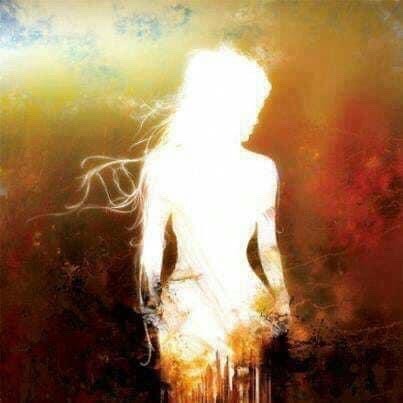
23 notes
·
View notes
Text
De Emma à Cristina
Chère Cristina,
Je suis désolée, je suis désolée, vraiment désolée ! Je me rends compte que le message que je viens de t’envoyer n’a ni queue ni tête, alors après l’avoir lu, jette-le et lis cette lettre. J’étais un peu hystérique quand je l’ai écrit ; je voulais tout te raconter au sujet de Mina qui avait disparue pendant plusieurs jours, mais je ne pouvais pas. Et quand j’ai pu, je me suis complétement déchargée. Encore une fois, désolée.
C’était horrible de ne pas pouvoir te parler de ce qu’il se passait. J’ai toujours détesté la politique, je ne t’apprends rien… mais même si ta situation (et celle de Mark) est inhabituelle, la Cour des Lumières considère certainement que vous faites partie de la suite de Kieran, et on nous avait formellement interdit de révéler à l’une ou l’autre Cour que Mina avait été enlevée dans sa propre chambre à Blackthorn Hall. Et nous avons obéi à la lettre.
Alors, il s’avère que la personne qui avait organisé l’enlèvement était Mère Hawthorn, la nourrice de la Première Héritière, qui a choisi d’épouser un Chasseur d’Ombres. Depuis, elle a eu des relations compliquées avec les Chasseurs d’Ombres, surtout avec les Herondale (qui n’a pas de relations compliquées avec les Herondale, on se le demande). Et là elle exigeait de parler à Kit comme condition pour que nous puissions récupérer Mina.
Personne ne voulait que Kit y aille, même si nous avions tous terriblement peur pour Mina. Mais il était résolu. On ne pouvait pas l’arrêter. Nous avons donc trouvé un arrangement grâce à quelques elfes intermédiaires pour que Kit rencontre Mère Hawthorn. Elle avait demandé à ce que le rendez-vous ait lieu près de l’eau d’un fleuve, alors nous sommes allés à la Promenade de Chiswick. Il y a un minuscule parc là-bas, et un petit kiosque à musique. Tous ensemble (Julian et moi, Tessa, Jem et Kit), nous y sommes allés sans dire un mot et avec des mines sombres. Tessa n’arrêtait pas de caresser Kit dans le dos, et c’était évident qu’elle essayait de ne pas pleurer. Jem avait l’air de vouloir tuer quelqu’un. Kit avait simplement l’air déterminé. Et Jules… je parlerai de Jules après.
Nous sommes restés un peu en arrière pendant que Kit traversait la pelouse pour rejoindre le kiosque. A son approche, Mère Hawthorn est apparue de derrière les arbres, avec Mina dans les bras, et s’est avancée vers lui.
Jules et moi nous sommes crispés, au cas où Jem ou Tessa se serait rué vers le bébé. Nous n’aurions pas pu leur en vouloir, mais nous savions que ce n’était pas possible. Kit devait pouvoir récupérer Mina sans violence. Tout ce que je peux dire, c’est qu’on voit qu’ils ont enduré d’innombrables épreuves tous les deux au cours de leur longue vie. Ils se serraient les mains, immobiles, mais c’était clair qu’ils avaient désespérément envie de courir vers leurs enfants. Ils faisaient preuve d’un incroyable sang-froid, et ça me brisait le cœur.
Kit et Mère Hawthorn se sont rejoints devant le kiosque. Evidemment nous n’entendions pas leur conversation, mais nous avons tout de suite vu Mina tendre les bras vers Kit. Il a tenté de la prendre, mais Mère Hawthorn s’est interposée. Elle n’avait pas du tout l’intention de la rendre et ils ont commencé à se disputer. Je voyais à quel point Kit était énervé même s’il essayait de garder son calme. Il n’arrêtait pas de faire non de la tête, presque à chaque fois que Mère Hawthorn prenait la parole.
Bref, ça a duré quelques minutes, puis Mère Hawthorn s’est mise à rire. Elle a tourné la tête (elle nous voyait, évidemment, et s’en moquait) et a claqué des doigts. Kit est tombé à la renverse ; il a fait une pirouette et s’est relevé. Mais des tiges noires émergeaient du sol, s’attaquaient à lui et s’enroulaient autour de ses jambes. Mina criait si fort que nous l’entendions.
- C’en est assez, a rugi Jem.
Il s’apprêtait à traverser la rue, mais Julian a posé une main sur son épaule.
- Attends, lui a-t-il dit.
Nous l’avons tous regardé, interloqués. Tu sais que j’ai une confiance absolue en Julian, mais pendant une seconde, même moi je me suis demandée s’il était devenu fou.
Et ensuite. Et ensuite il y a eu un énooorme bruit. J’ai d’abord cru que c’était un hélicoptère, ou peut-être plusieurs hélicoptères, mais ensuite j’ai compris que non, le bruit était plus étrange que ça… c’était des sabots qui frappaient le ciel. Ils sont passés au-dessus de nous… c’était Gwyn et Diana ! Enfin, c’était toute la Chasse Sauvage, ils étaient plus d’une vingtaine, certains sur des chevaux, d’autres sur des créatures ailées que je n’avais encore jamais vues. Mais à l’avant galopait Gwyn, et Diana était sur un autre cheval derrière lui, ses cheveux flottant au vent.
Diana est descendue en piqué et s’est emparée de Mina dans les bras de Mère Hawthorn. Gwyn la suivait et a saisi Mère Hawthorn d’un bras (ce gars est assez costaud, on dirait) et l’a jetée sur le dos de son cheval. Ça paraissait plutôt dangereux pour Mère Hawthorn, mais bon, on n’a pas beaucoup de sympathie pour les kidnappeuses.
Diana est descendue en piqué (c’est le truc de la Chasse Sauvage, les descentes en piqué, tu te souviens) sur nous, et a délicatement rendue Mina à Jem et Tessa. Puis Diana nous a fait un clin d’œil et est repartie dans le ciel. Elle, Gwyn et le reste de la Chasse Sauvage ont galopé plus vite que je ne le croyais possible. Je pense qu’ils devaient éloigner Mère Hawthorn de nous, ce qui était logique. En un rien de temps, ils avaient disparu dans les nuages.
Je dois dire que le clin d’œil de Diana était vraiment cool. Je me rends compte que ça me manque un peu de faire des trucs cools. Je crois que j’irai dans le jardin avec Cortana ce soir pour sévèrement décapiter des mauvaises herbes.
Enfin bref. Kit nous rejoignait en courant, Tessa pleurait de soulagement et Jem ne quittait pas des yeux l’endroit où la Chasse Sauvage avait disparue. Mina, évidemment, se portait à merveille. Elle répétait « Cheval ! Cheval ! », c’était hilarant, puis Kit est arrivé et l’a cajolée. Julian et moi nous sommes éloignés pour les laisser se retrouver tous les quatre.
Julian avait une de ces expressions sur le visage et j’ai eu une intuition :
- C’était toi, non ? Tu as contacté la Chasse Sauvage ?
Il a haussé les épaules :
- Mère Hawthorn avait dit de ne contacter ni la Cour des Lumières ni celle des Ténèbres, mais la Chasse Sauvage n’appartient à aucune. Ils n’ont prêté allégeance à personne.
- Mère Hawthorn non plus, ai-je répondu. Donc tu as dit quelque chose comme « Fées sauvages, venez récupérer votre amie sauvage, elle devient trop sauvage » ?
- C’était l’idée.
Il a dit ça d’un ton désinvolte, mais je voyais qu’il était fier de lui. Et oui, d’accord, j’étais fier de lui aussi, ce que je lui ai dit.
Sur le chemin du retour, nous avons demandé à Kit ce que Mère Hawthorn lui voulait. Il a expliqué qu’elle voulait lui dire qu’il était le descendant de la première tu-sais-qui (je sais que Kieran t’a parlé de l’héritage elfique de Kit, mais pas de tout, et peu de gens savent) et qu’elle était venue le chercher pour qu’il aille vivre au Royaume des Fées là où était sa place. Il a essayé de lui faire comprendre qu’il n’avait aucune envie de vivre au Royaume des Fées, que sa vie actuelle lui convenait (mais il a dit ça en regardant Jem et Tessa, et je crois qu’il préférait dire « convenir » plutôt que ce qu’il ressent vraiment, qui est bien plus que ça). Elle lui répétait que c’était son destin et son devoir, son avenir le rattrapera bien assez vite s’il ne s’y pliait pas, bla bla bla, des trucs de fées, tu sais comment elles sont. (Oh, ne le prend pas mal si tu lis aussi, Kieran.)
Mais je crois qu’il ne disait pas toute la vérité, parce que Mère Hawthorn s’est donnée beaucoup de mal simplement pour envoyer un tel message. Enfin, elle aurait pu écrire ça sur une carte postale. Ce n’était rien que Kit ne savait pas déjà pour ainsi dire. Je suis certaine qu’elle en a dit davantage que Kit ne souhaite pas révéler, je le voyais à son regard. J’espère qu’il le dira à Jem et Tessa, quand il sera prêt. Au moins, nous pouvons être sûrs que Gwyn fera en sorte que Mère Hawthorn le laisse tranquille… un souci de moins.
Ce sont toutes les nouvelles que j’ai, et je suis tellement soulagée de pouvoir enfin t’en parler. Je suppose que si Kieran veut en savoir plus, il devrait contacter Gwyn. Je crois t’avoir dit tout ce que je sais.
Prends soin de toi, et nous nous reparlerons bientôt. Embrasse K et M pour moi !
Emma
Texte original de Cassandra Clare ©
Traduction d’Eurydice Bluenight ©
Le texte original est à lire ici : https://secretsofblackthornhall.tumblr.com/post/696471730738397184/emma-to-cristina
#secrets of blackthorn hall#sobh#julian blackthorn#emma carstairs#cassandra clare#the shadowhuter chronicles#tsc#cristina rosales#kit herondale#mina carstairs#wild hunt#diana and gwyn#diana wrayburn#mother hawthorn#jem carstairs#tessa gray
8 notes
·
View notes
